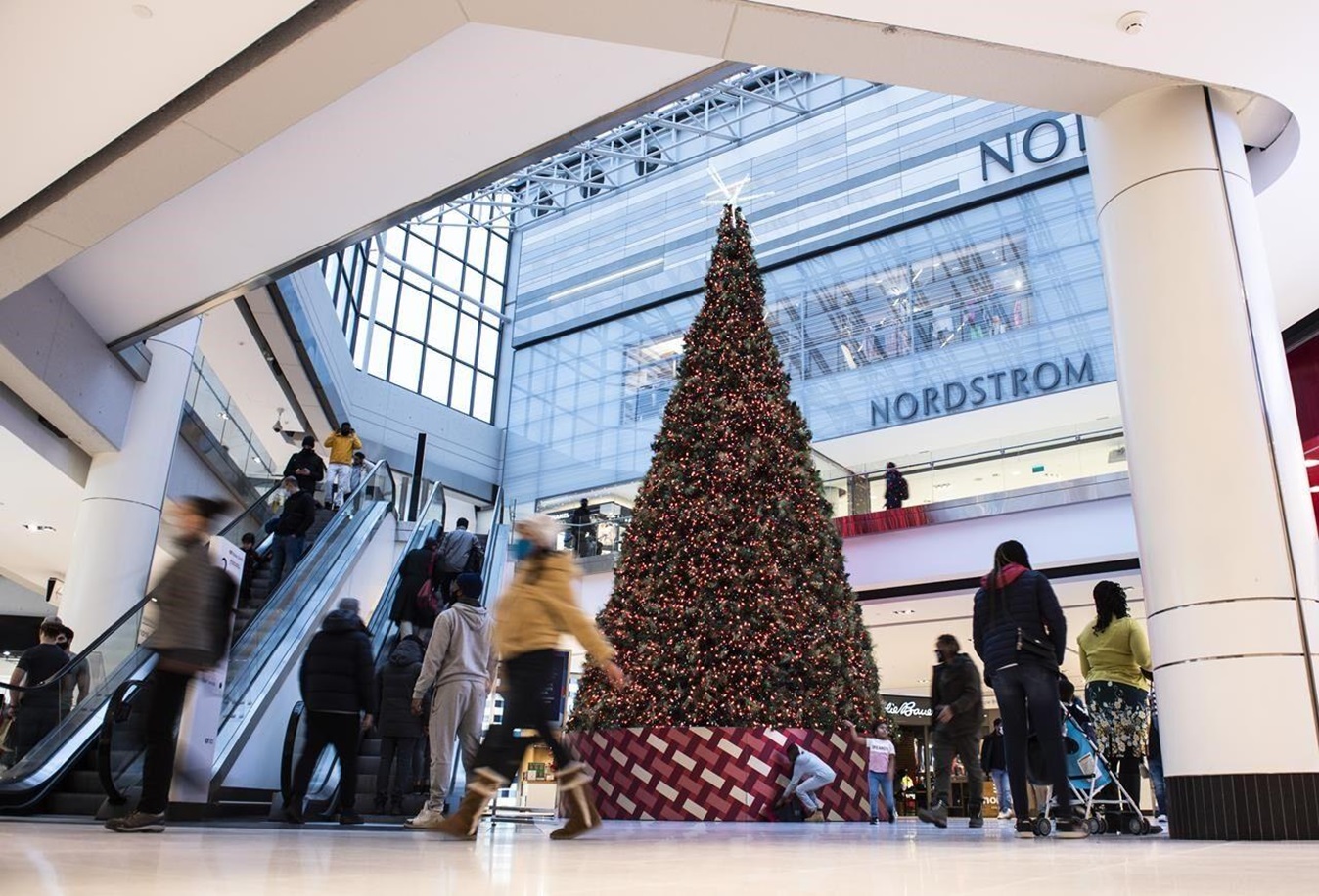
Shoppers stroll by a towering Christmas tree on Christmas Eve at an Ottawa mall on December 24, 2020. Amid festive decorations, Santa listens to kids' Christmas wishes, stores overflow with eggnog and gingerbread delights, and a wave of marketing assures that the ideal gift is just a credit card swipe away. THE CANADIAN PRESS/Justin Tang
In Toronto, the festive season is in full swing with children sharing their Christmas wishes with Santa at malls adorned in holiday splendor. Stores are bustling with the aroma of eggnog and gingerbread treats, while marketing campaigns promise the perfect gift just a credit card swipe away.
Amid the customary holiday cheer, new elements are poised to influence this bustling shopping season — inflation and the Bank of Canada's imposition of high interest rates to combat it. The combined effects of soaring prices in recent years and a policy rate standing at five percent threaten to dampen consumers' spending enthusiasm, potentially impacting retailers' profits.
Kostya Polyakov, national industry leader for consumer and retail at KPMG in Canada, notes the challenging landscape ahead for retailers. Consumer concerns about the high cost of living and limited funds for non-discretionary spending are prevalent, setting the stage for a uniquely demanding holiday shopping season.
According to an online survey conducted by KPMG between Oct. 20 and Nov. 2, 83 percent of the 1,507 Canadians surveyed are exercising greater caution in their spending compared to the previous year. Seventy percent have no plans to splurge on discretionary items like travel, apparel, electronics, entertainment, toys, and restaurants, with 66 percent intending to focus only on essential goods such as groceries and personal care products.
Polyakov emphasizes that consumers are likely to delay purchases until they perceive the prices to be at their lowest for the season. This cautious approach is evident in the mindset of shoppers at major retailers like Toys "R" Us Canada, where customers are increasingly prioritizing value and carefully considering their purchases.
Deloitte predicts a change in spending patterns, with the average Canadian shopper expected to spend $1,347 during the holiday season, reflecting an 11 percent decrease from the previous year. Shoppers are exhibiting a more thoughtful approach, with 48 percent planning to buy only what their families need, 71 percent seeking items on sale, and 29 percent opting for less expensive retailers.
The luxury market is not immune to these shifting dynamics. Carolyn Wright, senior vice-president of product at Holt Renfrew, anticipates a more cautious approach from Canadian consumers this holiday season, driven by economic considerations. Despite this, consumers are expected to make purposeful choices, seeking unique and meaningful gifts.
Executives from Spin Master, known for popular toys like Paw Patrol and Hatchimals, anticipate a late surge in consumer purchases. While October sales were below expectations, they highlighted the easing of supply chain issues and robust availability of this year's sought-after toy, Bitzee, a digital pet.
Walmart's Chief Financial Officer, John Rainey, noted a rebound in sales by November after "unseasonal" weather patterns. However, he remained cautious about consumer trends, echoing sentiments expressed by other retailers like Costco, which plans to introduce new toys closer to Christmas, allowing flexibility in pricing based on consumer demand.
As the holiday season unfolds against the backdrop of economic uncertainties, retailers are adapting their strategies to navigate the nuanced preferences of value-conscious consumers. The quest for unique experiences and meaningful purchases is shaping the shopping landscape, creating an environment where both caution and adaptability are key.















